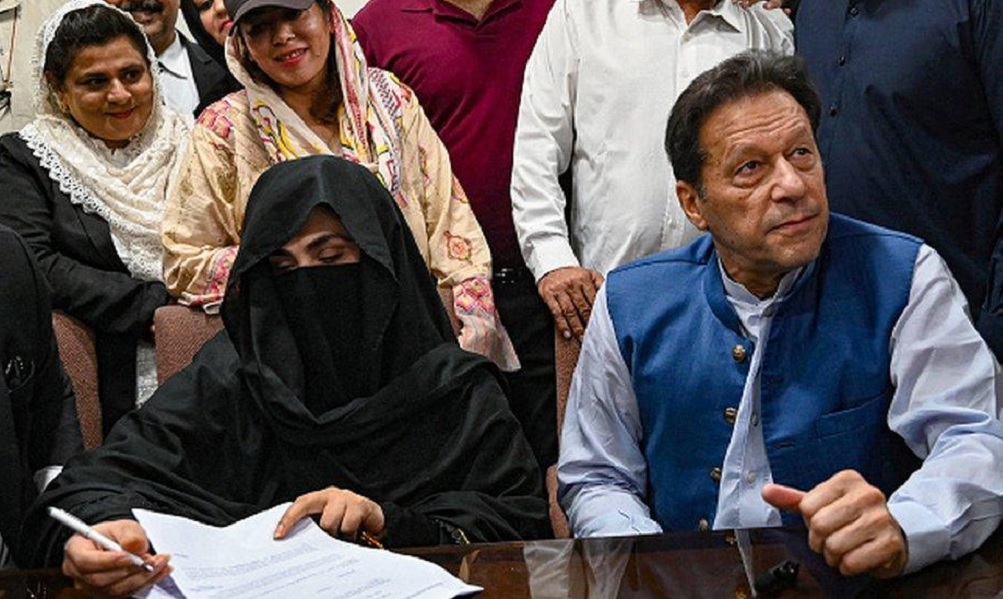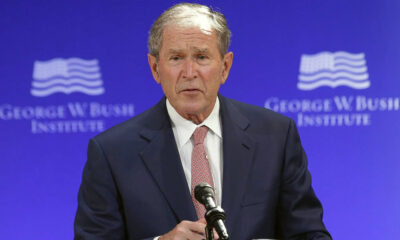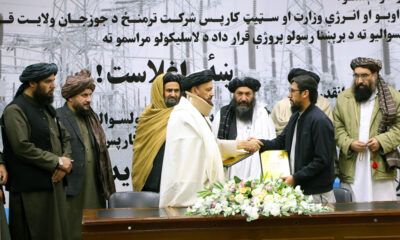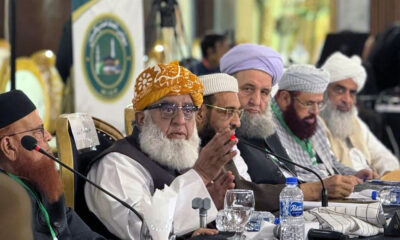Regional
17 killed as truck carrying pilgrims plunges into ravine in Balochistan’s Hub

At least 17 people were killed while over 40 sustained injuries after a truck carrying pilgrims plunged into a ravine in Balochistan’s Hub district on Wednesday, officials said.
Hub Assistant Superintendent of Police Ahmed Talha Wali confirmed the death toll and injuries.
He said the truck, carrying 50 people, was en route to the Shah Noorani shrine in Khuzdar from Thatta, Dawn reported.
He said the incident took place at 10pm last night, and that critically injured people had been taken to Jam Ghulam Qadir Hospital in Hub and Civil Hospital’s Trauma Centre in Karachi.
Earlier, Manan Baloch, the Edhi Foundation’s Hub in-charge, said that the rescue operation to retrieve the bodies and injured concluded Thursday morning.
Meanwhile, Deputy Commissioner Munir Ahmed told AFP that the truck was speeding and that the driver lost control while negotiating a turn.
In a statement issued earlier Thursday, Balochistan Chief Minister Mir Sarfraz Bugti expressed sorrow over the loss of lives, according to state-run Radio Pakistan.
Sindh Chief Minister Murad Ali Shah visited the Civil Hospital’s Trauma Centre and met with the injured persons.
Speaking to the media outside the facility, he said 40 people had been discharged so far while five were in critical condition.”
Road accidents with high fatalities are common in the country due to lax safety measures, poor driver training and decrepit transport infrastructure.
Passenger buses and trucks are frequently crammed to capacity and seatbelts are not commonly worn, meaning high death tolls from single-vehicle accidents are common.
According to the World Health Organisation estimates, more than 27,000 people were killed on Pakistan’s roads in 2018.
In January last year, 41 people were killed when their passenger bus, which was also loaded with containers of flammable oil, plunged into a ravine in Balochistan province and burst into flames.
Regional
Pakistan agrees to $4 billion arms deal with Libyan National Army
The package reportedly includes air, land and naval equipment and may involve the sale of JF-17 fighter jets and Super Mushak trainer aircraft to Libya.

Pakistan has reached a military equipment deal worth more than $4 billion with Libya’s eastern-based Libyan National Army (LNA), Pakistani officials said, despite a long-standing United Nations arms embargo on the country.
The agreement was finalised following a recent meeting in Benghazi between Pakistan’s Army Chief, Field Marshal Asim Munir, and Saddam Khalifa Haftar, the LNA’s deputy commander-in-chief. Officials said the deal will be implemented over about two and a half years, Reuters reported.
According to officials familiar with the agreement, the package includes air, land and naval equipment and may involve the sale of JF-17 fighter jets and Super Mushak trainer aircraft. Estimates of the deal’s value range between $4 billion and $4.6 billion, making it one of Pakistan’s largest-ever defence exports.
The LNA confirmed entering a defence cooperation pact with Pakistan, covering weapons sales, training and military manufacturing, though it did not provide details. Haftar described the agreement as the start of a “new phase of strategic military cooperation.”
Libya has been under a UN arms embargo since 2011, requiring international approval for weapons transfers. It remains unclear whether exemptions have been sought. Pakistani officials said the deal does not violate UN restrictions, noting that several countries continue to engage militarily with Libyan factions.
Pakistan has been actively expanding its defence exports, promoting its domestically produced and China co-developed JF-17 fighter as a lower-cost alternative to Western aircraft.
The Libya agreement would mark a significant expansion of Pakistan’s defence footprint in North Africa amid growing international competition for influence in the country.
Regional
Imran Khan calls for street movement, urges public to reclaim rights
Khan has appealed for collective action, saying the movement was necessary to restore the rule of law, ensure justice, and end what he described as politically motivated and pre-determined court decisions.

Former Pakistani Prime Minister Imran Khan has called on his supporters and the wider public to prepare for a nationwide street movement, urging citizens to rise in defense of their fundamental rights.
In a message issued from Adiala Jail, where he is currently detained, Khan appealed for collective action, saying the movement was necessary to restore the rule of law, ensure justice, and end what he described as politically motivated and pre-determined court decisions.
Khan said the recent verdict against him was part of sustained political pressure, alleging that the ruling was delivered without due legal process and without giving him a fair opportunity to present his defense. He warned that such practices have severely damaged the credibility of Pakistan’s judicial system.
The former prime minister also called on lawyers, constitutional experts, and members of the legal community to stand with the public and play an active role in safeguarding the Constitution and the rule of law. He said political stability and economic progress were impossible without an independent and impartial judiciary.
Addressing civil-military relations, Khan said his criticism was aimed at individuals rather than institutions. He described the military as belonging to the people of Pakistan, while alleging that actions taken against him in detention were carried out on the instructions of military authorities.
Khan drew comparisons with the 2007 political crisis, warning that continued erosion of the rule of law would have lasting consequences for the country. He praised judges who resist pressure as national heroes and criticized those who, he said, follow orders without question.
The statement comes amid heightened political and judicial tensions in Pakistan, with Khan’s trial and detention continuing to draw strong domestic and international attention.
Regional
Pakistan court hands Imran Khan, wife 17-year jail terms in another graft case

A Pakistani court on Saturday sentenced former Prime Minister Imran Khan and his wife Bushra Bibi to 17 years in prison each in a corruption case involving the under-priced purchase of luxury state gifts, the court and Khan’s lawyers said.
The latest conviction adds to a series of legal troubles for Khan, who has been behind bars since August 2023, and is currently serving a 14-year sentence in a separate land graft case, Reuters reported.
He faces dozens of cases filed since he was ousted from office in 2022, ranging from corruption to anti-terrorism and state secrets charges. Khan has denied wrongdoing in all the cases, which his party says are politically motivated.
“The court announced the sentence without hearing the defence and sentenced 17 years imprisonment to Imran Khan and Bushra Bibi with heavy fines,” Khan’s family lawyer Rana Mudassar Umer told Reuters.
They were handed 10 years’ rigorous imprisonment under Pakistan’s penal code for criminal breach of trust and a further seven years under anti-corruption laws, the special court of Pakistan’s Federal Investigation Agency said in its verdict.
He faces dozens of cases filed since he was ousted from office in 2022, ranging from corruption to anti-terrorism and state secrets charges. Khan has denied wrongdoing in all the cases, which his party says are politically motivated.
“The court announced the sentence without hearing the defence and sentenced 17 years imprisonment to Imran Khan and Bushra Bibi with heavy fines,” Khan’s family lawyer Rana Mudassar Umer told Reuters.
They were handed 10 years’ rigorous imprisonment under Pakistan’s penal code for criminal breach of trust and a further seven years under anti-corruption laws, the special court of Pakistan’s Federal Investigation Agency said in its verdict.
Khan’s jail term from Saturday’s ruling would begin after he has served the 14 years from the land graft case, Information Minister Attaullah Tarar said.
The case relates to luxury watches gifted to Khan by Saudi Arabia’s Crown Prince Mohammed bin Salman during official visits, which prosecutors said Khan and his wife then purchased from the state at a heavily discounted price in violation of Pakistan’s gift rules.
Tarrar said the purchase resulted in losses of several million rupees for the state.
Zulfi Bukhari, a spokesperson for Khan, said the verdict “ignores basic principles of justice” and turns the process into “a tool for selective prosecution.”
Khan has told his legal team to appeal the decision at the Islamabad High Court, Salman Safdar, another one of his lawyers, told reporters outside the jail where the trials were being held, Geo News reported.
ANOTHER STATE GIFTS CONVICTION
The case is separate from an earlier state gifts prosecution linked to Khan’s August 2023 arrest. Earlier sentences of 14 years for Khan and seven years for Bushra Bibi were later suspended on appeal. The couple denies wrongdoing.
The cases are commonly known in Pakistan as the Toshakhana cases, referring to the state repository where gifts received by public officials are deposited.
Following the verdict, Khan’s Pakistan Tehreek-e-Insaf (PTI) party announced plans for protests across Punjab on Sunday.
Khan’s party also says routine family and legal visits have been blocked in recent weeks despite court orders. Authorities deny any mistreatment and say he is receiving all facilities available to prisoners.
Khan, a former cricket star turned politician, remains one of Pakistan’s most polarising figures, with his legal battles unfolding as his Pakistan Tehreek-e-Insaf party remains sidelined from power.
-

 Latest News2 days ago
Latest News2 days agoAfghanistan signs 30-year deal for marble mining in Daikundi
-

 Latest News4 days ago
Latest News4 days agoAfghan border forces prevent illegal entry of hundreds into Iran
-

 Latest News3 days ago
Latest News3 days agoPakistan summons Afghan diplomat over deadly attack in North Waziristan
-

 Latest News3 days ago
Latest News3 days agoAfghan health minister calls for medical cooperation between Kabul and New Delhi
-

 Latest News4 days ago
Latest News4 days agoJapan allocates nearly $20 million in humanitarian aid for Afghanistan
-

 Latest News3 days ago
Latest News3 days agoKarzai urges reopening of girls’ schools and universities for Afghanistan’s bright future
-

 Latest News2 days ago
Latest News2 days agoBush Institute criticizes Trump administration’s Afghan immigration freeze
-

 Health4 days ago
Health4 days agoIndia issues over 200 medical visas to Afghans in last four months
























